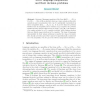Free Online Productivity Tools
i2Speak
i2Symbol
i2OCR
iTex2Img
iWeb2Print
iWeb2Shot
i2Type
iPdf2Split
iPdf2Merge
i2Bopomofo
i2Arabic
i2Style
i2Image
i2PDF
iLatex2Rtf
Sci2ools
108
click to vote
MFCS
2005
Springer
2005
Springer
Strict Language Inequalities and Their Decision Problems
Systems of language equations of the form {ϕ(X1, . . . , Xn) = ∅, ψ(X1, . . . , Xn) = ∅} are studied, where ϕ, ψ may contain set-theoretic operations and concatenation; they can be equivalently represented as strict inequalities ξ(X1, . . . , Xn) ⊂ L0. It is proved that the problem whether such an inequality has a solution is Σ2-complete, the problem whether it has a unique solution is in (Σ3 ∩Π3)\(Σ2 ∪Π2), the existence of a regular solution is a Σ1-complete problem, while testing whether there are finitely many solutions is Σ3-complete. The class of languages representable by their unique solutions is exactly the class of recursive sets, though a decision procedure cannot be algorithmically constructed out of an inequality, even if a proof of solution uniqueness is attached.
Related Content
| Added | 28 Jun 2010 |
| Updated | 28 Jun 2010 |
| Type | Conference |
| Year | 2005 |
| Where | MFCS |
| Authors | Alexander Okhotin |
Comments (0)

